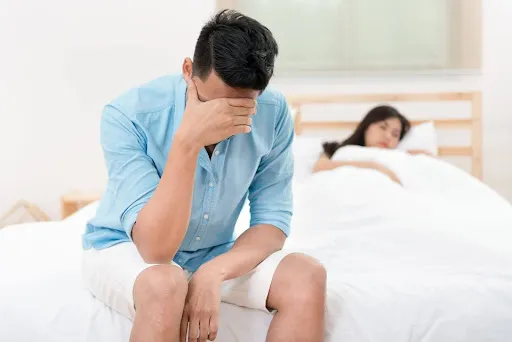Nightfall, also called wet dreams or nocturnal emission, is the involuntary release of semen during sleep. It’s a natural process, especially common during puberty when hormone levels fluctuate. Most men experience nightfall at some point in their lives. While it usually decreases with age, some may have frequent episodes due to hormonal changes, stress, or lifestyle factors. While most cases are harmless, frequent episodes may signal underlying issues.
But why does nightfall happen? Let's break down the science behind it, when to be concerned, and how to manage it effectively.
4 Major Causes of Nightfall
The reasons behind nightfall vary, but biology and psychology play key roles. Here’s a breakdown of the four main causes:
1. Hormonal Surges
Nightfall is common during puberty because the body produces more testosterone. This hormone increases semen production, and when the body has extra, it may release it through nightfall. It is a natural process that helps the reproductive system stay balanced.
The body adjusts to these changes over time, and nightfall usually happens less often as testosterone levels stabilize. Some people may experience it more frequently if their hormone levels fluctuate due to stress, diet, or lifestyle factors. This is why nightfall is more common in younger individuals.
How to Manage It:
- Maintain a balanced diet rich in zinc & magnesium (found in nuts, seeds, leafy greens).
- Exercise regularly to stabilize hormones and reduce stress-induced fluctuations.
2. Sexual Dreams
The brain stays active during sleep, processing emotions and thoughts. Sometimes, it creates dreams with romantic or sexual themes. These dreams can stimulate the brain’s arousal centers, causing an erection and leading to ejaculation. This response is natural and does not require conscious effort.
The body reacts to signals from the brain, just as it does when awake. Some people may experience nightfall more often if they frequently have such dreams, but this does not indicate a problem. It is simply a normal part of how the body functions.
How to Manage It:
- Reduce exposure to explicit content, especially before bedtime.
- Practice mindfulness meditation to manage intrusive thoughts.
3. Physical Triggers
A full bladder can press against nearby nerves and the prostate gland, sending signals to the brain that resemble those of sexual arousal. This pressure can lead to involuntary ejaculation during sleep. The body often clears out excess semen to maintain a healthy reproductive system.
Hydration and bladder habits may influence how often this happens. Drinking too much fluid before bed or holding urine for long periods can increase pressure and make nightfall more likely. Wearing tight underwear or sleeping in certain positions may also increase genital stimulation.
How to Manage It:
- Empty your bladder before sleeping.
- Wear loose, breathable underwear at night.
4. Weak Pelvic Muscles
Pelvic floor muscles help control the release of semen, but if these muscles are weak, they may struggle to hold it in during arousal. This can lead to nightfall, especially if other triggers are present. Weak muscles may result from a sedentary lifestyle, lack of exercise, or poor posture.
How to Strengthen Pelvic Muscles:
- Practice Kegel exercises daily.
- Stay physically active to improve blood circulation and muscle tone.
These factors answer why nightfall happens, it’s often the body’s way of balancing itself.
Health Conditions That May Cause Frequent Nightfall
Nightfall is usually a normal part of the body’s functioning, but certain health issues can increase how often it happens. Identifying and treating the root cause can help reduce the occurrence of nightfall.
-
Anxiety and stress can lead to increased arousal during sleep.
-
Hormonal imbalances may cause the body to release semen more often.
-
Prostate problems can trigger nightfall due to pressure on nearby nerves.
-
Lack of physical activity can weaken pelvic floor muscles.
-
Poor sleep quality can increase the chances of vivid dreams.
-
Certain medications may affect hormone levels or muscle control.
Age and Nightfall: Why It Peaks in Puberty
Studies show 83% of men experience nightfall by age 20. Puberty’s hormonal chaos, specifically rising testosterone, explains why nightfall happens more during adolescence.
As men age, frequency typically drops due to stable hormone levels and regular sexual activity. However, abstaining from sex or masturbation for extended periods can reignite episodes.
Does Nightfall Affect Fertility?
No, nightfall does NOT cause infertility. It is simply the body's way of:
- Removing excess sperm to maintain reproductive health.
- Keeping the testicles functioning properly.
- Regulating hormone levels naturally.
Nightfall does not reduce sperm count permanently or impact a man’s ability to have children.
How to Reduce Frequent Nightfall: Practical Solutions
Managing nightfall involves lifestyle tweaks and physical exercises. If nightfall happens too often and disrupts your daily life, these strategies can help:
|
Strategy |
How It Helps |
|
Pelvic Floor Exercises/Kegel exercises |
Strengthen pelvic muscles for better ejaculation control. |
|
Cold Showers Before Bed |
Reduce blood flow to genitals, lowering arousal. |
|
Balanced Diet |
Limit stimulants & eat zinc-rich foods (pumpkin seeds, almonds). |
|
Mindfulness Meditation |
Reduce stress and overactive thoughts before sleep. |
|
Regular Sexual Activity |
Prevents semen buildup, reducing involuntary release. |
|
Avoid Caffeine Before Bed |
Lowers stimulation of the nervous system. |
Consistency is Key!. Pair these with adequate sleep and hydration for better long-term results.
Natural Ways to Prevent Nightfall
Nightfall is a natural process, but if it happens too often, it can cause stress or discomfort. Here are some easy and natural ways to help prevent nightfall:
1. Exercise regularly to keep your body active and improve blood flow, which can help reduce nightfall.
2. Practice relaxation techniques like meditation or deep breathing to lower stress and anxiety.
3. Avoid watching or reading sexually stimulating content, especially before bedtime.
4. Keep your bladder empty before sleep by using the restroom to reduce physical pressure.
5. Eat a balanced diet rich in fruits, vegetables, and whole grains to support hormone balance.
6. Strengthen pelvic floor muscles with simple exercises like Kegels for better control during sleep.
Treatments for Frequent Nightfall
Nightfall issues can disturb your peace of mind and sleep at night, but there are treatments available. The right choice of treatment is determined by the underlying causative factors which could be physical, hormonal, or psychological.
The following treatments are supported by research and clinical practice for those experiencing frequent episodes:
1. Physical therapy
Strengthening of the pelvic muscles through Kegel exercises improves control over ejaculation.
2. The daily routine (10 seconds holds 3 times a day)
This helps in tightening the perineum and control involuntary leaks. Faster results can be achieved if physical therapists design programs.
3. Hormone therapy
In cases where blood tests indicate elevated testosterone levels, short-term didrogesterone blockers can be administered as they escort flowing testosterone for a while.
This is an extreme form of treatment done under strict medical care due to the extreme fatigue and low bone density side effects.
4. Cognitive Behavioral Therapy
For nightfall cases associated with anxiety, CBT breaks the bothersome thinking patterns around nightfall. Therapists instruct patients on how to control relaxation and manage stress to break worrying cycles that trigger escalations of a fall episode.
5. Herbal & Ayurvedic Remedies
Ashwagandha helps regulate testosterone and cortisol levels. Shilajit boosts energy and hormonal balance. Always consult an Ayurvedic practitioner before using herbs.
Policying these with lifestyle changes like reduced caffeine intake or not watching inappropriate content before sleeping usually yields the best results. Be patient, change won't happen overnight.
Dig Deeper: How to Stop Nightfall Permanently: know Effective Strategies
When Should You Worry About Nightfall?
Occasional nightfall is normal. Seek help if you notice:
- Pain during urination or ejaculation - Could signal infection, blockages, or prostate inflammation.
- Blood in semen or urine - May indicate infections, kidney stones, or tumors.
- Daily episodes affecting energy or mood - Leads to weakness, irritability, or depression over time.
- Erectile dysfunction or low libido - Suggests hormonal imbalances or circulatory issues.
- Fever or chills with nightfall - Points to infections like prostatitis or UTIs.
- Unexplained weight loss or fatigue - Could link to chronic illness or nutrient deficiencies.
- Persistent lower back/pelvic pain - Might reflect kidney issues or prostate congestion.
- Difficulty emptying your bladder fully - Signals prostate enlargement or urinary tract problems.
- Unusual discharge or foul odor - Often a sign of bacterial or sexually transmitted infections.
- Anxiety disrupting daily life - Fear of nightfall harms work, relationships, or mental health.
These symptoms may indicate infections, hormonal imbalances, or prostate issues.
Final Thoughts
This article helps explain why nightfall happens and clears up common concerns about its effects on health. We learn that nightfall is NOT harmful. It’s a natural way for the body to regulate hormone levels, remove old sperm, and maintain reproductive health. However, if it happens too frequently and affects your energy levels, confidence, or sleep quality, consider making lifestyle changes or consulting a doctor.
Need Expert Advice? Credihealth Can Help!
If you're experiencing frequent nightfall and need personalized guidance, Credihealth connects you with top doctors for expert advice.
Talk to a specialist today! Book an online consultation with trusted healthcare professionals and get the right solutions for you. Click here to schedule an appointment now!
Frequently Asked Questions
Can certain foods increase nightfall frequency?
Yes. Spicy foods, caffeine, and excessive sugar may overstimulate nerves, raising the risk.
Does abstaining from sex reduce nightfall?
No. Abstinence increases semen buildup, making nightfall more likely. Moderation is key
Is nightfall linked to low testosterone?
Rarely. High testosterone often causes it. However, hormonal tests can rule out imbalances.
Can stress trigger nightfall?
Yes. Stress disrupts sleep and hormone levels, potentially increasing episodes.
Do pelvic exercises really help?
Yes. Strengthening pelvic muscles improves ejaculatory control, reducing leakage.
Does nightfall affect fertility?
No. It releases semen but doesn’t lower sperm count enough to impact fertility.
How is nightfall different from premature ejaculation?
Nightfall is involuntary and occurs during sleep. Premature ejaculation happens during awake sexual activity.
Reviewed by







